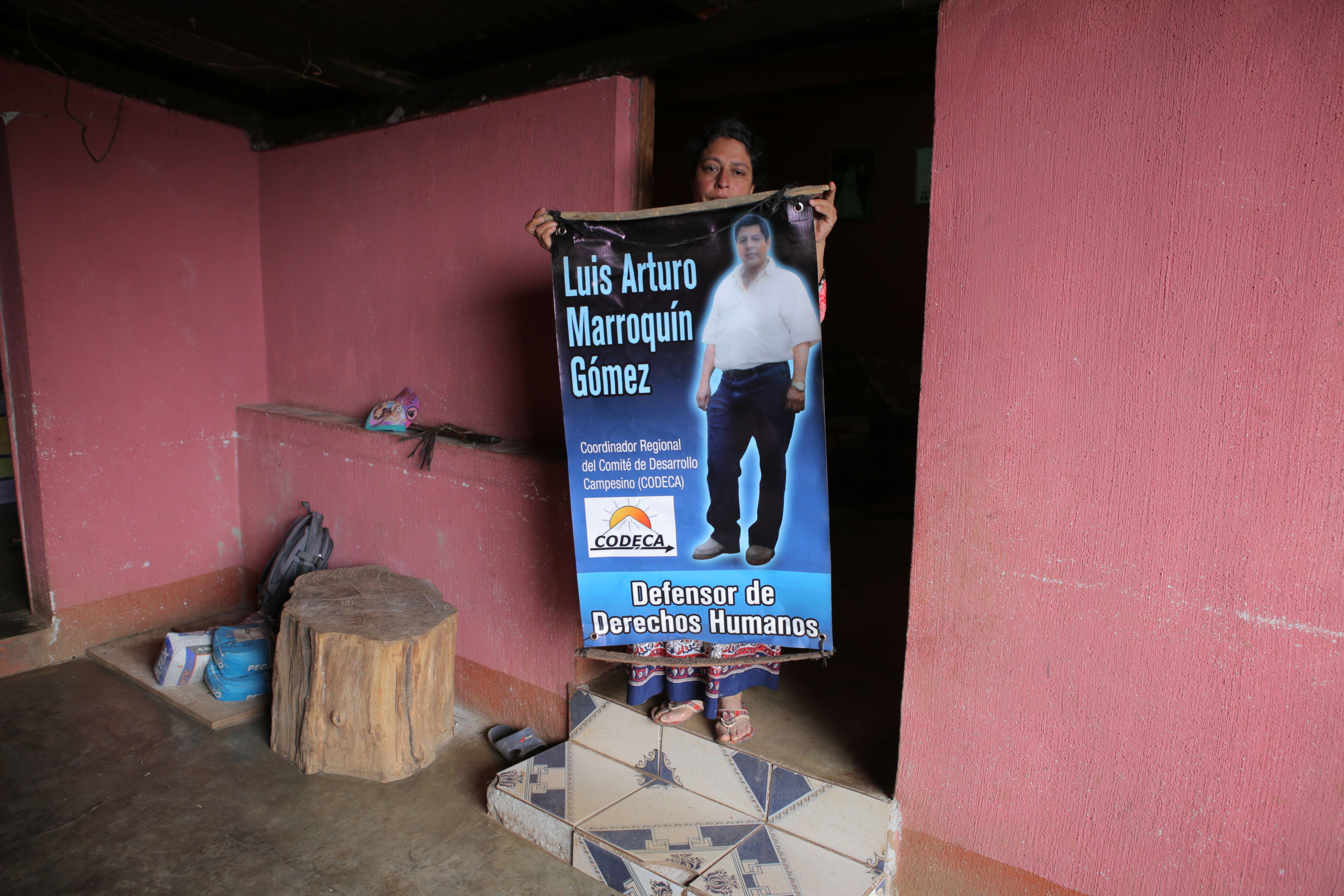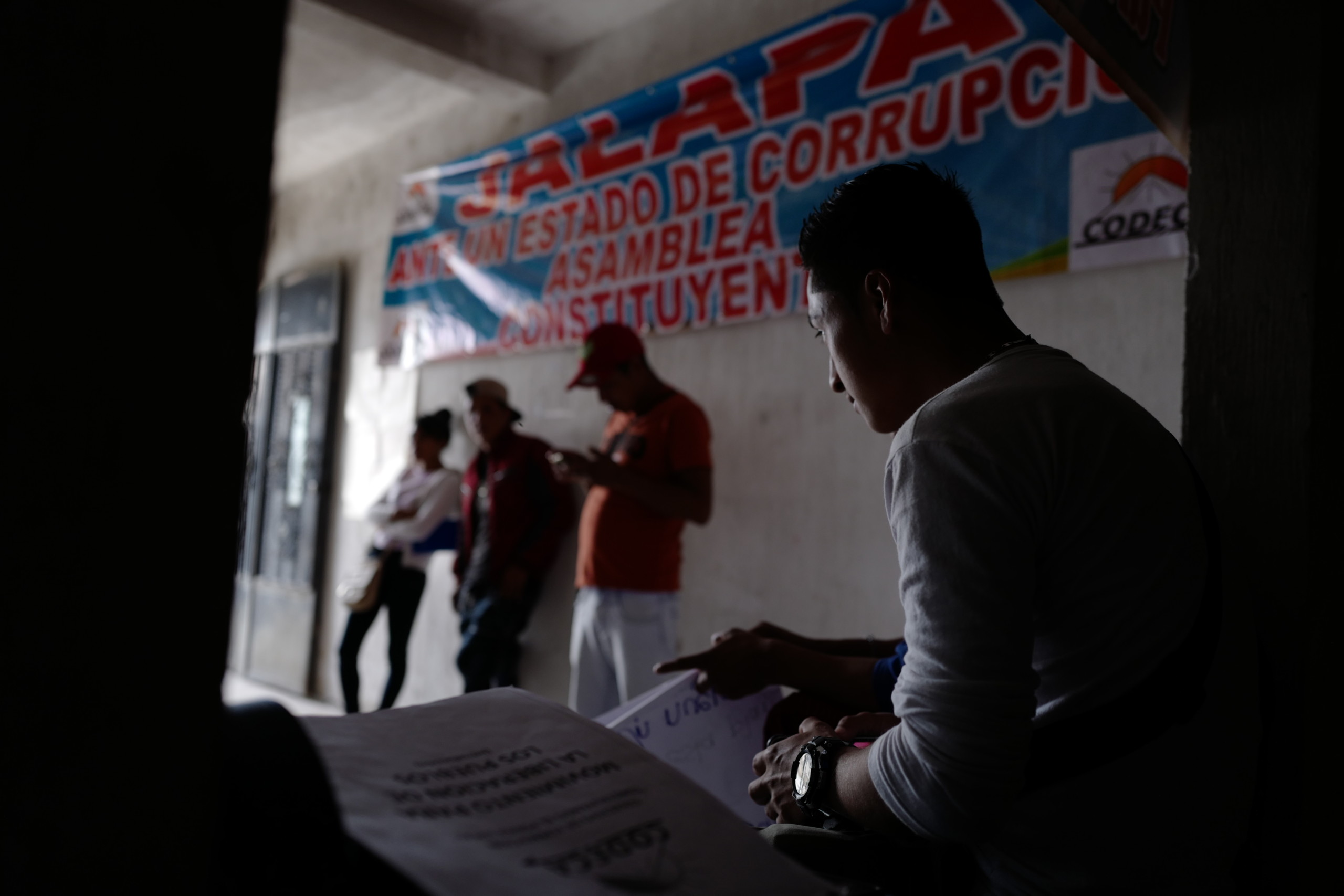9 May 2018
San Luis Jilotepeque, Guatemala
Luis Marroquín
Profession
Community
Motive
Environmental and indigenous activism
Political dissent


Adolfo Olivas


Ahmed Divela


Amit Jethwa


Artan Cuku


Babita Deokaran


Bayo Ohu


Berta Cáceres


Bhupendra Veera


Bill Kayong


Boris Nemtsov


Boško Buha


Chai Boonthonglek


Charl Kinnear


Chut Wutty


Chynybek Aliev


Cihan Hayirsevener


Daphne Caruana Galizia


Darío Fernández


Derk Wiersum


Deyda Hydara


Édgar Quintero


Edmore Ndou


Edwin Dagua


Federico Del Prete


Fernando Villavicencio


Gezahegn Gebremeskel


Gilles Cistac


Habibur Mondal


Igor Alexandrov


Jacob Juma


Ján Kuciak


Javier Valdez


Joannah Stutchbury


José Ángel Flores


Jules Koum Koum


Kem Ley


Luis Marroquín


Mahamudo Amurane


Marcelo Rivera


María Elena Ferral Hernández


Marielle Franco


Milan Pantić


Milan Vukelić


Muhammad Khan


Nelson García


Nihal Perera


Oliver Ivanović


Orel Sambrano


Perween Rahman


Peter R. de Vries


Rajendra Singh


Salim Kancil


Sandeep Sharma


Sikhosiphi Radebe


Slaviša Krunić


Soe Moe Tun


Victor Mabunda


Virgil Săhleanu


Wayne Lotter


Yuniol Ramírez


Zezico Guajajara
9 May 2018
San Luis Jilotepeque, Guatemala
Profession
Community
Motive
Environmental and indigenous activism
Political dissent
On the morning of 9 May 2018, in the marigold-yellow central plaza of San Luis Jilotepeque, human-rights defender and community organizer Luis Arturo Marroquín stepped off a bus and entered a small store. He was scheduled to facilitate a workshop on civic responsibility that morning but, first, he needed to make some photocopies.
A few moments after he entered the store, two men emerged from a black Toyota Hilux and shot him nine times. It was approximately 9 a.m.
Marroquín was an indigenous Maya Q’eqchi activist on the national board of the Campesino Development Committee (CODECA in Spanish), a grassroots organization that fights for indigenous rights in education, health, energy and land. Marroquín had worked with CODECA for half a decade. As the coordinator for eastern Guatemala, he played a pivotal role in growing the organization’s regional presence.
On the same day, some 85 miles away – in the capital, Guatemala City – the organization was formally filing paperwork to launch its own political party, the Movement for People’s Freedom (MLP in Spanish). The new party aimed to move from protesting policy to shaping it in elected office. The party’s ultimate goal is to call a constitutional assembly and re-found Guatemala as a truly plurinational country.
It was too early for Marroquín to announce his own intentions for the 2019 elections but, according to his family, he had planned to run for office. And it would not have been the first time: he had run for mayor of his local village, San Pedro Pinula, in 2015. Marroquín didn’t win the election but served two terms on the village council.
Marroquín’s murder marked the start of a gruesome month for Guatemalan rights defenders. Seven indigenous activists were killed within days of one another. They were all affiliated with CODECA or a similar organization, the Campesino Committee of the Highlands (CCDA in Spanish). The first set of killings, starting with Marroquín, saw three activists shot dead around the country. Three weeks later, four more were killed by machete or knife attacks.
CODECA and the CCDA have both been outspoken defenders of indigenous and land rights. They educate members on legal rights, oppose harmful extractive industries and multinationals, and demand the resignation of corrupt officials – including, successfully, that of former president Otto Pérez Molina in 2015.
In recent years, both groups have shifted their tactics in a bid to transform the political system from within. The CCDA backed candidates in the 2015 election, and CODECA registered for the 2019 cycle. This presented a new threat to the establishment.
A week before Marroquín’s assassination, President Jimmy Morales – who is also being investigated for corruption – publicly lashed out against CODECA. After Marroquín’s death, the organization said in a press statement that it ‘publicly holds President Jimmy Morales responsible’.
Guatemala has long been a dangerous place for human-rights defenders. The Guatemalan Human Rights Defenders Protection Unit (UDEFEGUA in Spanish) has been tracking violence in the country. According to the unit, a defender has been killed about once a month since 2000 – and that number has been increasing. In 2015, 11 human-rights defenders were killed; 10 in 2016; 52 in 2017; and, in 2018, seven in one month
CODECA has been particularly hard hit. Neftalí López Miranda, one of the organization’s national leaders and the MLP’s candidate for vice president, said they have lost 38 members since the movement was founded. CODECA started on a sugar plantation in 1992, when 17 labourers banded together to protest against low pay, explained López. The group organized a strike and succeeded in having their salaries increased from 1.5 quetzals to 3 quetzals a month. They began to expand, mobilizing for land and water rights. In 2003 and 2004, they fought exploitative electricity prices. Today, the organization has a presence in 180 mostly rural communities around Guatemala.
In the area of Jalapa, Marroquín’s main focus was electricity. In an interview with the local magazine, EntreMundos, Marroquín explained: ‘There are a lot of rural people who have two, three lightbulbs. They don’t have a fridge or sound system or TV, and yet they’re paying Q200-250 per month. These are people who live on their crops. They don’t make any money.’ Many residents began refusing to pay for subscriptions, and instead began to connect directly – and illegally – to the electricity grid.

Marroquín's widow holds up a poster of her ex-husband, a 'defender of human rights'

Marroquín's family one year after his murder

Young men supporting CODECA, the NGO Marroquín worked for
Nearly a year after Marroquín and his six fellow activists were assassinated, the killers remain at large. They have been described as ‘unknown assailants’. According to NACLA magazine, this suggests that the crimes were contract killings conducted by professional hitmen. These so-called sicarios (hired assassins) are believed to be connected to state forces and therefore act with impunity. In 2017, Iván Velásquez, head of the International Commission Against Impunity in Guatemala, found that 97 per cent of crimes in the country go unsolved.
Though no one has been arrested or charged for the murder, Marroquín’s family and former colleagues believe they know who might have been behind his death. His youngest son, Hector David, describes how his father had become a thorn in the side of local politicians – and especially the sitting mayor, José Manuel Méndez Alonzo – as well as the power distributor, Energuate.
Nery Rolando Agustín López, who worked closely with Marroquín since CODECA first established a presence in Jalapa nine years ago, now single-handedly takes on the duties that the two men had previously shared. An empty house in San Pedro Pinula serves as the headquarters both for CODECA and, now, the MLP. From here, Agustín López recalls how much has changed since he and ‘comrade Luis’ first began their work. ‘Everyone now has a voice and a vote. They have reclaimed their rights.’ From virtually zero, they built up a membership base of 6 000 members. That number is still growing.
Marroquín’s killers may still be at large, protected by a system that has always been stacked against the most vulnerable. But, for CODECA, that inequality only fuels their cause and commitment.


14 August 2005
Esteli, Nicaragua
Adolfo Olivas


2 March 2016
Honduras
Berta Cáceres


6 November 2011
Penonomé, Panama
Darío Fernández


15 May 2022
Santander de Quilichao, Colombia
Édgar Quintero


7 December 2018
Cauca, Colombia
Edwin Dagua


9 August 2023
Quito, Ecuador
Fernando Villavicencio


15 May 2017
Culiacán, Mexico
Javier Valdez


18 October 2016
Tocoa, Honduras
José Ángel Flores


9 July 2009
San Isidro, El Salvador
Marcelo Rivera


30 March 2020
Papantla, Veracruz, Mexico
María Elena Ferral Hernández


14 March 2018
Rio de Janeiro, Brazil
Marielle Franco


15 March 2016
Honduras
Nelson García


16 January 2009
Valencia, Venezuela
Orel Sambrano


13 October 2017
Santo Domingo, Dominican Republic
Yuniol Ramírez


31 March 2020
Zutiwa, State of Maranhão, Brazil
Zezico Guajajara